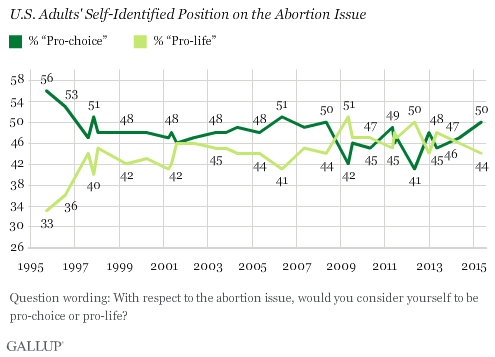Poll: Most Americans Identify as ‘Pro-Choice’ for the First Time in Seven Years
For the first time since 2008, significantly more Americans described themselves as “pro-choice” than “pro-life” in a Gallup poll asking for their position on “the abortion issue.”

For the first time since 2008, significantly more Americans described themselves as “pro-choice” than “pro-life” in a Gallup poll asking for their position on “the abortion issue.”
Fifty percent of survey respondents said they were “pro-choice” while 44 percent said they were “pro-life” in answering the question, “With respect to the abortion issue, would you consider yourself to be pro-choice or pro-life?”
The other 6 percent of respondents either said they had mixed views, that neither label applied, that they didn’t know what the term meant, or that they had no opinion. These responses were volunteered, and not given as options in the poll question.
In the mid-1990s, the gap between the two answers was much wider in the Gallup poll, with far fewer respondents considering themselves “pro-life.”
But that has changed in the last 15 years, most notably in 2009, when “pro-life” clearly beat “pro-choice” for the first time at 51 percent to 42 percent. In the other years since then, excluding 2012 when “pro-life” saw another peak, respondents have been closely divided, and the gap between the two answers has been within the margin of error.
“The pro-choice view is not as prevalent among Americans as it was in the mid-1990s, but the momentum for the pro-life position that began when Barack Obama took office has yielded to a pro-choice rebound,” Gallup’s analysis noted.
Pollsters found that while women and men felt similarly about abortion from 2001 to 2011, a gender gap has emerged over the past three years, with fewer men than women calling themselves pro-choice. More women call themselves pro-choice now than in 2001, while about the same number of men do.
Democrats and people 35 and older are more likely to call themselves pro-choice now than in 2001, while the percentage of Republicans, independents, and young people calling themselves pro-choice has stayed about the same.
News reports often use Gallup’s polling to support the idea that Americans are divided on abortion. But more detailed polling shows how much question wording matters, and that even larger majorities of Americans support reproductive rights despite their own conflicted moral views on the issue.
A recent Vox poll found more “pro-choice” than “pro-life” respondents, but even more who identified as “both” or “neither.” The Vox poll also found broader support for reproductive rights when the questions prompted people to think about the experiences of women having the procedure.
At least seven in ten respondents thought women who choose abortion should have a comfortable, nonjudgmental experience with medically accurate information—even though less than half said they thought abortion should be legal in all or most cases.
Six in ten thought states are “going in the wrong direction” when they pass laws making it harder for women to get abortion care.
And overall support for legal abortion in all or most cases jumped from 46 to 53 percent just by changing the question wording from “Abortion should be legal,” to “Women should have a legal right to safe and accessible abortion.”

